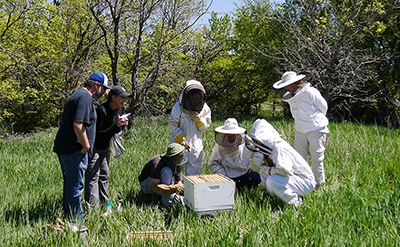Something buzzing on FHSU campus this summer

05/17/16 rg
By Randy Gonzales
University Relations and Marketing
HAYS, Kan. - The population of the Fort Hays State University campus is going to get a lot bigger this summer.
Somewhere between 12,000 and 15,000 honey bees were recently settled in a hive on the outskirts of the FHSU campus. By this summer, that number could swell to as many as 60,000 bees, said Ryan Engel, a Hays junior who is the vice president and treasurer of the new FHSU Bee Club.
FHSU provides an exciting opportunity with this club, said Engel, a conservation biology major.
"It's completely awesome," he said. "It's definitely something very unique. We're very lucky at this university to have the opportunity to do this."
The bee club, which organized in spring 2016, has about 20 members. FHSU sustainability coordinator Andree Brisson is the sponsor. Club president Elissa Jensen, Hays freshman, said part of the organization's mission is to educate about bees.
"Bees are very important," said Jensen, whose family manages bee hives at their farm north of Hays. "They pollinate a third of our crops. Every third bite, a bee has something to do with."
Jensen wants to educate the public about Colony Collapse Disorder, which has plagued honey bees since 2006. With CCD, there are no worker bees in the colony, which still has the queen bee and immature bees present. Jensen believes pesticides are part of the problem.
"A lot of people spray their crops with pesticides," Jensen said. "That actually is killing the bees. I'm trying to get that word out."
With the FHSU colony, the hope is to eventually produce honey, which can then be sold. The queen bee can lay as many as 2,000 eggs per day. Those new worker bees eventually join the others in foraging for nectar, producing honey.
"My family and Andree wanted to pollinate the plants in the garden that's part of Fort Hays State," Jensen said. "We needed bees to do that. We thought we could start a bee club, and so far, it's going really good."
The bees will need to be checked on periodically this summer. To avoid getting stung when they check the hive, members will wear beekeeper suits such as the ones worn to establish the colony. Jensen's family manages about 40 hives, and her mom and dad will help check on the bees initially.
"Hopefully, some of the members will want to suit up with me, and I won't need my mom and dad here to check the hive," Jensen said.
Engel said he will help check on the bees this summer. He and Jensen have yet to be stung.
"It's how people handle them," Engel said. "I learned firsthand working with them the more relaxed you are around bees the more relaxed they are around you."
Those interested in joining the bee club or in seeking more information can contact Jensen at etjensen@mail.fhsu.edu.